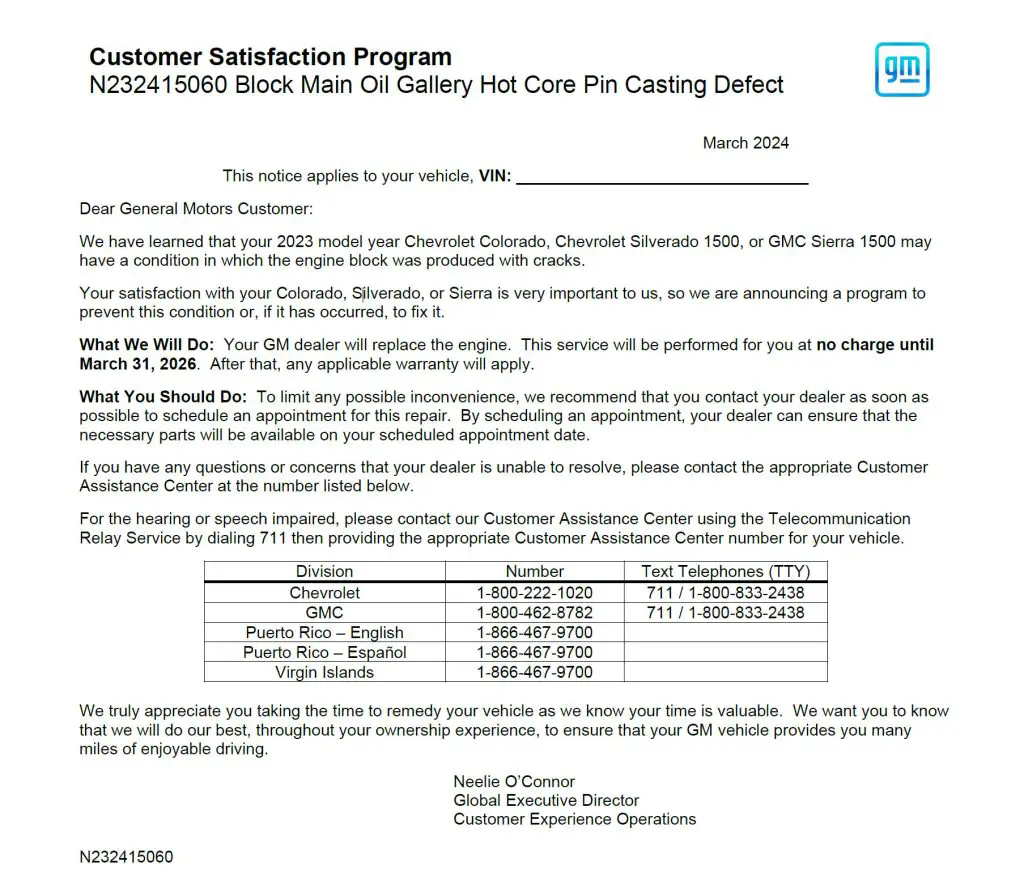Chevrolet and GMC have determined that some L3B 2.7L Turbocharged Engines were produced with engine blocks that have cracks or could crack. In a preventative measure, the brands will replace any engine potentially involved.
UPDATE: 3/5/2024 – Read Our New Article – “HERE’S WHAT EVERYONE (INCLUDING US) GOT WRONG ABOUT THE 2.7L CRACKED BLOCK / ENGINE REPLACEMENT STORY”
Earlier this month General Motors released Customer Satisfaction Program “N232415060”, which covers a “Block Main Oil Gallery Hot Core Pin Casting Defect.” The program identifies that an uncertain number of 2023 Chevrolet Colorado, 2023 Chevrolet Silverado 1500, and 2023 GMC Sierra 1500 could have defective engines. Interestingly, the program does not cover 2023 GMC Canyon pickups, which also use the L3B engine.
Owners who have trucks covered under this engine replacement program will receive this letter or something similar:

The GM 2.7L Turbo engine, known as the L3B, represents a significant stride in General Motors’ engine technology, particularly within its truck lineup. Initially launched in the 2019 models of the Chevrolet Silverado and GMC Sierra 1500, the L3B engine was designed to offer an optimal blend of power and efficiency in GM’s full-size pickup segment. With an output of 310 horsepower and 348 lb-ft of torque from its turbocharged, four-cylinder configuration, the engine challenged traditional norms by delivering V8-like performance with a smaller footprint, appealing to a broad spectrum of truck enthusiasts who prioritize both power and fuel economy.

Expanding its reach within GM’s portfolio, the L3B engine was later adopted into the mid-size truck segment, powering the Chevrolet Colorado and GMC Canyon. This move not only diversified the engine’s application but also reinforced GM’s commitment to providing efficient and capable powertrain options across different truck categories. The introduction of the 2.7L Turbo into the Colorado and Canyon models brought a new level of performance and efficiency to the mid-size truck market, offering drivers a compelling alternative to the more traditional powertrains. This strategic deployment underscores GM’s innovative approach to engineering, ensuring that vehicles like the Silverado, Sierra, Colorado, and Canyon benefit from the latest advancements in powertrain technology, thereby maintaining their competitive edge in their respective segments.
Repairs under this satisfaction program will be covered under warranty, and vehicle owners will be provided a vehicle loaner while the engine is being replaced.


